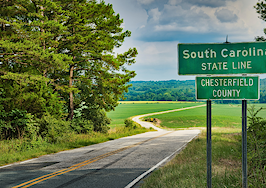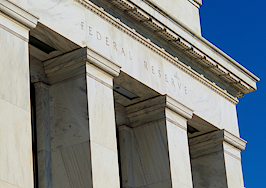On Monday morning President Joe Biden attempted to assuage his country’s fears.
The new Omicron variant of the coronavirus is eventually going to get to the U.S., Biden said from a White House lectern, and “we’ll have to face this new threat just as we face those who have come before it.” But that doesn’t mean the crisis is taking a turn for the worst.
“This variant is a cause for concern,” Biden ultimately concluded, “not a cause for panic.”
But in the real estate industry, at least, Biden’s warning against panic may have been unnecessary; Inman spent the day Monday talking to agents, business leaders and economists, virtually all of whom indicated the new Omicron variant is unlikely to immediately bring about massive change in the housing world.
That’s in part because the variant is new and numerous questions — about its symptoms, severity, transmissibility and other factors — remain unanswered. But it’s also because after nearly two years of living through a pandemic, real estate professionals are seasoned veterans at working in crisis mode. There’s also a bit of fatigue setting in when it comes to scary new headlines, and all in all news of the new variant is being met with more of a shrug than a panic.
Real estate will forge ahead
The brokers who spoke with Inman said they don’t anticipate huge disruptions thanks to the Omicron variant.

Teresa Boardman
Teresa Boardman, a broker and the owner of Boardman Realty in Minnesota, said she is seeing differing levels of compliance with COVID-19 protocols in different parts of her market. In the city, people tend to be vaccinated and wear masks. Further out in the suburbs, that’s less the case. But she ultimately concluded that she doesn’t see the new variant significantly changing those behaviors.
“I think things will continue as they are,” Boardman said. “For one thing we don’t know enough about this new variant right now. And there’s an awful lot of people who aren’t going to let a variant or a pandemic affect how they live or what they do.”
Boardman went on to say that if the new variant proved to be especially deadly or debilitating, people might respond more substantively. But after so much experience with the pandemic, including the rise of the previous Delta variant, “as long as people can go about their daily routine, I don’t think they care.”

Andrea Geller
Andrea Geller, a broker with Berkshire Hathaway HomeServices in Chicago, agreed that the Omicron variant on its own is unlikely to be a game changer. She noted that during the early months of the pandemic, the real estate market ultimately boomed — even though fear and concern about the outbreak was arguably at its highest point. If people kept moving to new homes then, Geller noted, they’ll probably keep moving now.
“People still have to buy homes,” she told Inman. “All we can do is try to be as safe as we can be and ensure our clients that that’s how we’re working.”
Others in the industry also envision adaptation, rather than disaster, in the near future.

Chris Drayer
Chris Drayer — cofounder of real estate technology firm Revaluate and an Inman contributor — described the rise of the Omicron variant as “sad news,” and noted that “the data we look at shows the pandemic not ever really ‘ending’ as was widely discussed in early 2020, but continuing to evolve.”
However, Drayer also noted that “it looks to us like people will adapt to the conditions, but with caution.”
Fatigue is setting in
The idea that a mysterious new coronavirus variant isn’t going to prompt panic in the housing market may sound obvious at this point, but it’s worth reflecting on just how far that means the U.S. has come. During the early days of the COVID-19 outbreak, the country largely shut down, grocery store aisles ran empty, and real estate consumers sprinted to new regions. The coronavirus was an all-consuming news story for months.
So why would a new strain of the disease prompt shrugs rather than panic?
One possible explanation is that people are simply tired after so many chapters in the coronavirus story.

Peter Schravemade
“I would say the Australians and definitely the Americans, they’re definitely experiencing COVID fatigue,” Peter Schravemade, an Australia-based director at BoxBrownie.com, told Inman.
Schravemade said this is especially true in his native Australia, which chose a suppression strategy and has consequently kept much of its population in a higher level of isolation than other countries. But he also noted that across the global real estate industry there appears to be “a sense of depression that this has been going on for a very long time.” Case in point: Schravemade observed that a recent post in the Inman Coast to Coast Facebook group about the Omicron variant generated few comments or discussion. That’s a far cry from earlier in the crisis, when anything COVID-related seemed to prompt an explosive discussion.
“With relation to America, it’s just the general lack of comments I’m seeing,” Schravemade said. “They don’t even want to talk about it any more.”
None of this is to minimize the human toll of the pandemic, which in the U.S. has included more than 700,000 deaths so far. But the point is that in some corners, emerging threats may have progressively diminishing impacts on the public consciousness.
The economics are sound
Like the agents who spoke with Inman, economists who are watching the Omicron variant also don’t expect huge immediate impacts to the housing market. Matthew Gardner — chief economist for Windermere Real Estate and an Inman contributor — described Monday what might be characterized as an extension of a nearly two-year holding pattern as people wait to make major life decisions until they know what’s going on.

Matthew Gardner
“I honestly believed there are a lot of would-be homebuyers sidelined, waiting for some clarification from their companies,” he told Inman. “If companies are going to wait even longer, that wave of additional demand that I’m expecting to see once employees get that clarification might get pushed back even further.”
Gardner also said he believes the Omicron variant could delay the return of international real estate demand if countries return to policies that keep their borders shut for prolonged periods.
“I really was expecting to see far greater interest from foreign buyers next year now that they’re allowed to come into the country,” Gardner said, adding that uncertainty related to the new variant could change that outlook somewhat.
On the other hand, Gardner ultimately thinks that even with a new variant, 2022 should ultimately be a good one for the housing industry.
“The market in 2022 is going to be positive,” Gardner concluded. “Were going to see demand exceed supply. We’re going to break 6 million transactions next year.”

Jeff Tucker
Jeff Tucker, a senior economist with Zillow, also doesn’t envision the new variant derailing the housing industry. He noted that Omicron itself should have little effect on housing prices themselves, and that the most likely impact would be on mortgage rates — something other experts also envision.
“I do think this could go hand in hand at least with mortgage rates not rising as fast as they were going to,” Tucker told Inman Monday.
Tucker went on to note that the Delta variant of COVID-19, which began spreading widely in the U.S. earlier this year, is probably the best analog to what could happen now. And significantly, the arrival of the Delta variant coincided with a drop in mortgage rates.
“I don’t think it’s a stretch to attribute some of that to Delta,” he added.
Beyond rates, Tucker also expects other trends such as migration from one region to another — a process Zillow executives have called “the Great Reshuffling” — to continue even as Omicron spreads.
“The pandemic accelerated an existing trend of people moving toward places with warmer winters and more affordable newer housing stock,” Tucker said. “Our data for 2021 suggested that trend kept right on going. I don’t see the variant changing that dramatically.”








